Nissan X-Trail vs Peugeot 2008 – Performance, range & efficiency compared
Both models have their strengths – but which one suits you more?
Compare performance, efficiency, price and space directly: Nissan X-Trail or Peugeot 2008?
Battle of the SUVs: Nissan X-Trail vs. Peugeot 2008
In the bustling world of compact SUVs, two models stand tall with their stylish designs and innovative features—the Nissan X-Trail and the Peugeot 2008. Both vehicles offer a range of options catering to different needs and preferences, but how do they stack up against each other in terms of performance, innovation, and practicality? Let’s dive into the details and compare these automotive contenders.
Power and Performance
The Nissan X-Trail comes with a choice of Petrol Mild Hybrid Electric Vehicle (MHEV) and Full Hybrid options. The engine provides a range of power outputs from 163 HP to 213 HP, with maximum torque going up to an impressive 525 Nm. It offers both Front-Wheel and All-Wheel Drive options, integrating smoothly with its automatic transmission. The acceleration from 0-100 km/h ranges from 7 to 9.6 seconds, depending on configuration, with a top speed of up to 200 km/h.
On the other hand, the Peugeot 2008 offers an array of engine choices, including petrol, MHEV, and fully electric options. Its power range is between 101 HP and 156 HP for combustion engines, while the electric motor peaks at 156 HP. The Peugeot's maximum torque reaches 270 Nm, and it manages a swift 0-100 km/h time of 8.3 seconds in its electric guise. For those leaning green, the electric model has an impressive range of up to 406 km.
Innovations and Efficiency
Nissan X-Trail showcases forward-thinking engineering with its hybrid technology, particularly the full hybrid model that achieves a commendable consumption rate of 5.7 L/100km. It carries a CO2 emission as low as 131 g/km, offering a relatively eco-friendly ride in its segment.
Conversely, the Peugeot 2008 excels in efficiency, particularly the electric variant that boasts zero CO2 emissions and a consumption rate as low as 15.5 kWh/100km. This positions Peugeot as a sustainable option for city commuters conscious of their carbon footprint.
Dimensions and Practicality
When it comes to size, the Nissan X-Trail is a more capacious option with its length of 4680 mm and a trunk capacity that can extend up to 585 liters. It can accommodate up to seven passengers, adding a layer of versatility for larger families or groups.
Meanwhile, the Peugeot 2008 is more compact with a length of 4304 mm and trunk capacity of 434 liters, designed for urban consumers who need maneuverability and efficiency in crowded cityscapes.
Conclusion
Choosing between the Nissan X-Trail and the Peugeot 2008 ultimately depends on your priorities. The X-Trail is an excellent choice for those seeking power, versatility, and innovation with its hybrid technologies. On the flip side, the Peugeot 2008 offers a balanced approach for urban mobility, especially appealing in its electric variant with zero emissions and higher efficiency.
Both vehicles have carved a niche in the SUV arena, each catering brilliantly to diverse lifestyle needs. Whether you value performance in an all-terrain vehicle or prefer a sustainable urban cruiser, both the Nissan X-Trail and Peugeot 2008 stand ready to deliver.
Here’s where it gets real: The technical differences in detail
Costs and Efficiency: Price and efficiency are key factors when choosing a car – and this is often where the real differences emerge.
Peugeot 2008 has a noticeable advantage in terms of price – it starts at 24500 £, while the Nissan X-Trail costs 34000 £. That’s a price difference of around 9566 £.
Fuel consumption also shows a difference: the Peugeot 2008 manages with 5 L and is therefore slightly more efficient than the Nissan X-Trail with 5.70 L. The difference is about 0.70 L per 100 km.
Engine and Performance: Power, torque and acceleration say a lot about how a car feels on the road. This is where you see which model delivers more driving dynamics.
When it comes to engine power, the Nissan X-Trail has a noticeable edge – offering 213 HP compared to 156 HP. That’s roughly 57 HP more horsepower.
In acceleration from 0 to 100 km/h, the Nissan X-Trail is a bit quicker – completing the sprint in 7 s, while the Peugeot 2008 takes 8.30 s. That’s about 1.30 s faster.
In terms of top speed, the Peugeot 2008 performs hardly perceptible better – reaching 206 km/h, while the Nissan X-Trail tops out at 200 km/h. The difference is around 6 km/h.
There’s also a difference in torque: the Nissan X-Trail pulls significantly stronger with 525 Nm compared to 270 Nm. That’s about 255 Nm difference.
Space and Everyday Use: Whether family car or daily driver – which one offers more room, flexibility and comfort?
Seats: Nissan X-Trail offers clearly perceptible more seating capacity – 7 vs 5.
In curb weight, the Peugeot 2008 is evident lighter – 1263 kg compared to 1668 kg. The difference is around 405 kg.
In terms of boot space, the Nissan X-Trail offers distinct more room – 585 L compared to 434 L. That’s a difference of about 151 L.
In maximum load capacity, the Peugeot 2008 performs barely noticeable better – up to 1467 L, which is about 43 L more than the Nissan X-Trail.
When it comes to payload, Nissan X-Trail a bit takes the win – 574 kg compared to 460 kg. That’s a difference of about 114 kg.
All in all, the Nissan X-Trail shows itself to be dominates this comparison and secures the title of DriveDuel Champion.
It impresses with the more balanced overall package and proves to be the more versatile companion for everyday use.
Nissan X-Trail
The Nissan X-Trail stands out with its spacious interior and practical design, making it an ideal choice for families and adventure enthusiasts alike. Its sleek exterior styling is complemented by modern technology features that enhance both driving pleasure and safety. This versatile SUV offers a comfortable ride, whether navigating city streets or exploring off-road paths, ensuring you travel in style and comfort.
details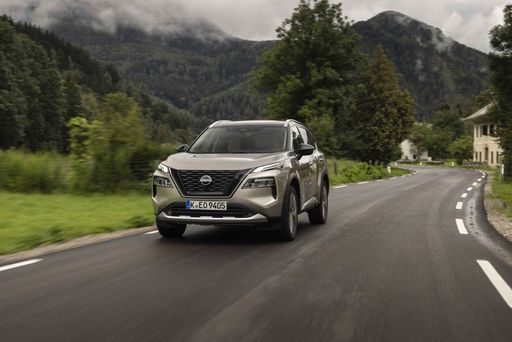 @ germany.nissannews.com
@ germany.nissannews.com
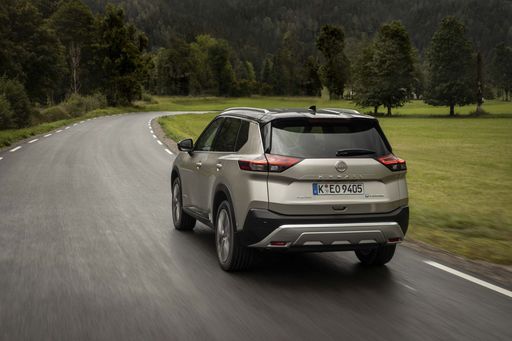 @ germany.nissannews.com
@ germany.nissannews.com
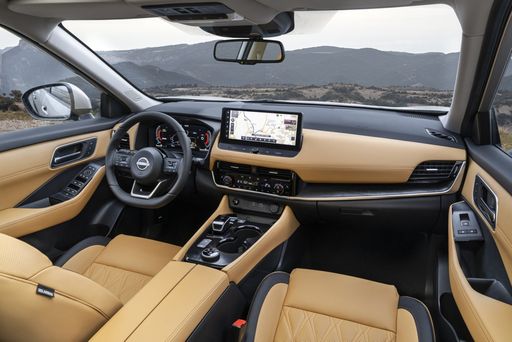 @ germany.nissannews.com
@ germany.nissannews.com
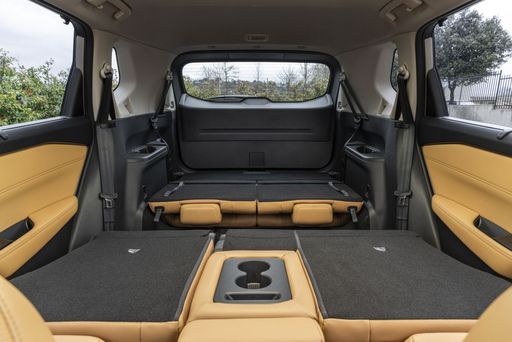 @ germany.nissannews.com
@ germany.nissannews.com
Peugeot 2008
The Peugeot 2008 stands out in the compact SUV market with its blend of striking design and practical functionality. It offers a comfortable ride with a sophisticated interior that exudes quality, making it ideal for both urban commutes and longer journeys. The model's efficient performance and range of modern features further enhance its appeal to a diverse range of drivers.
details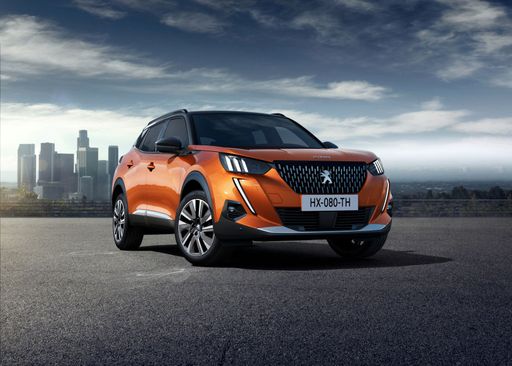 @ media.stellantis.com
@ media.stellantis.com
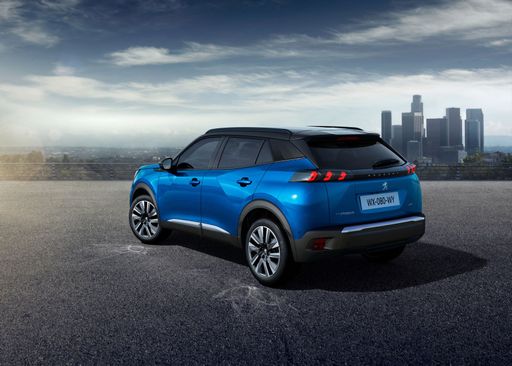 @ media.stellantis.com
@ media.stellantis.com
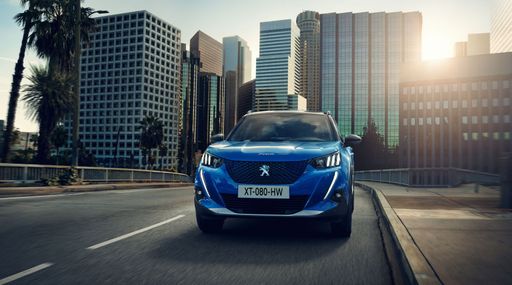 @ media.stellantis.com
@ media.stellantis.com
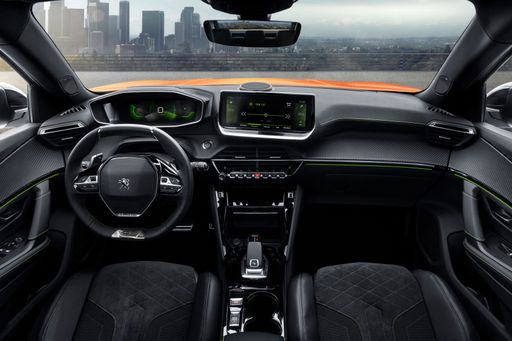 @ media.stellantis.com
@ media.stellantis.com

|

|
|
|
|
Costs and Consumption |
|
|---|---|
|
Price
34000 - 50400 £
|
Price
24500 - 40300 £
|
|
Consumption L/100km
5.7 - 6.9 L
|
Consumption L/100km
5 - 6.2 L
|
|
Consumption kWh/100km
-
|
Consumption kWh/100km
15.50 kWh
|
|
Electric Range
-
|
Electric Range
406 km
|
|
Battery Capacity
-
|
Battery Capacity
51 kWh
|
|
co2
131 - 161 g/km
|
co2
0 - 140 g/km
|
|
Fuel tank capacity
55 L
|
Fuel tank capacity
44 L
|
Dimensions and Body |
|
|---|---|
|
Body Type
SUV
|
Body Type
SUV
|
|
Seats
5 - 7
|
Seats
5
|
|
Doors
5
|
Doors
5
|
|
Curb weight
1668 - 1961 kg
|
Curb weight
1263 - 1623 kg
|
|
Trunk capacity
177 - 585 L
|
Trunk capacity
434 L
|
|
Length
4680 mm
|
Length
4304 mm
|
|
Width
1840 mm
|
Width
1770 mm
|
|
Height
1720 mm
|
Height
1523 mm
|
|
Max trunk capacity
1396 - 1424 L
|
Max trunk capacity
1467 L
|
|
Payload
432 - 574 kg
|
Payload
407 - 460 kg
|
Engine and Performance |
|
|---|---|
|
Engine Type
Petrol MHEV, Full Hybrid
|
Engine Type
Petrol, Electric, Petrol MHEV
|
|
Transmission
Automatic
|
Transmission
Manuel, Automatic
|
|
Transmission Detail
CVT, Reduction Gearbox
|
Transmission Detail
Manual Gearbox, Reduction Gearbox, Automatic Gearbox, Dual-Clutch Automatic
|
|
Drive Type
Front-Wheel Drive, All-Wheel Drive
|
Drive Type
Front-Wheel Drive
|
|
Power HP
163 - 213 HP
|
Power HP
101 - 156 HP
|
|
Acceleration 0-100km/h
7 - 9.6 s
|
Acceleration 0-100km/h
8.3 - 10.9 s
|
|
Max Speed
170 - 200 km/h
|
Max Speed
150 - 206 km/h
|
|
Torque
300 - 525 Nm
|
Torque
205 - 270 Nm
|
|
Number of Cylinders
3
|
Number of Cylinders
3
|
|
Power kW
120 - 157 kW
|
Power kW
74 - 115 kW
|
|
Engine capacity
1497 cm3
|
Engine capacity
1199 cm3
|
General |
|
|---|---|
|
Model Year
2024
|
Model Year
2023 - 2025
|
|
CO2 Efficiency Class
F, D, E
|
CO2 Efficiency Class
D, A, E, C
|
|
Brand
Nissan
|
Brand
Peugeot
|
Is the Nissan X-Trail offered with different drivetrains?
The Nissan X-Trail is offered with Front-Wheel Drive or All-Wheel Drive.
The prices and data displayed are estimates based on German list prices and may vary by country. This information is not legally binding.
